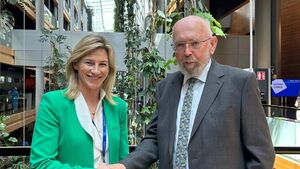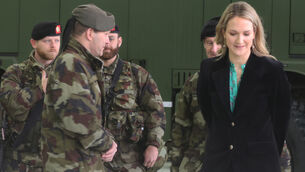Kettle's Boyled: A new beginning in Strasbourg

John Mulligan, Boyle congratulating MEP Nina Carberry at the opening session of the new parliament in Strasbourg on July 16th.
I was in Strasbourg last week to witness the opening of the new session of the European Parliament. I had been to the Parliament many times, but never on the opening day, and it was on my wish list.
The whole European project is an extraordinary exercise in democracy that has made Europe prosperous and peaceful since the original Coal and Steel agreement was agreed in 1951. That initiative to prevent further wars and integrate the nations of Europe became the European Economic Community by the Treaty of Rome in 1957. The EEC became the EC, the European Community, in 1993 with the Treaty of Maastricht, and in 2009 the EC formally became the European Union. The EU has certainly been the making of Ireland, taking us from third-world status to being one of the most prosperous countries in the world.
The initial aim of the Coal and Steel agreement was to prevent another war between France and Germany. The border between these countries moved a lot in the early half of the twentieth century, with Strasbourg part of Germany during World War Two. The European Parliament moves from Brussels to Strasbourg for one week in every month, a complicated exercise that nevertheless is part of the agreement that brought peace to all of Europe. It might look unwieldy, and it is a tiring trip for staff and MEPs every month, but it is symbolically important in that it recognises the historical context of Strasbourg.
Anyone can visit the Parliament, but I was lucky to have been invited to the opening session, and to have a seat in the gallery above the President. Guests sitting there were able to see the 720 members file in to the chamber.
The session began with members and visitors standing for the playing of the EU anthem, Beethoven’s ‘Ode to Joy.’ It was a spine-tingling moment, a visible show of unity from 720 elected representatives from 27 countries. Instead of fighting wars, they will spend the next five years debating and negotiating as each one attempts to be a voice for the people who sent them there. It is a place of consensus; not everybody will get everything they want. There are 450 million citizens represented by the EP, so it is impossible to keep everybody happy. But the overall focus of the Parliament, rooted as it is in social justice and fairness, means a lot of things can be and are delivered by MEPs that work hard and network well. It is a place of co-operation, not of shouting and posturing, but I think our new MEPs know that already. I wish them well.






